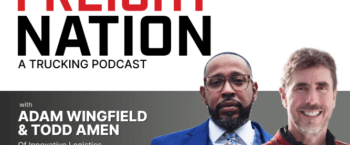Your 2024 Regulatory Roadmap: Changes Ahead and Their Potential Impact

Listen up!
Check out our podcast, Freight Nation, where industry experts talk all things trucking.
As anticipation mounts for a 2024 freight market turnaround, experts remain mixed in their predictions. The market is on track to experience modest growth, but challenges like tight margins will likely continue to affect the industry.
With trucking regulations in flux that will inevitably impact drivers and the industry, it’s critical to know what’s being discussed and how you can prepare your business for the road ahead.
Compensation and Labor Regulation Updates
While there aren’t any concrete compensation and labor regulation updates expected to take effect in 2024, there are ongoing studies and proposals to keep on your radar.
Detention Pay Reforms
The FMCSA is conducting a study on driver compensation as mandated by a 2021 infrastructure law from Congress. This study, which is projected to conclude in July 2024, determines how various aspects of driver compensation, including detention pay, affect both safety and driver retention. Another ongoing FMCSA study (expected to be completed in July 2025) specifically investigates detention time.
Together, these two studies will give the FMCSA a better understanding of the impact of detention time on drivers and carriers. Many drivers have long been advocating for fairer detention pay—an Owner-Operator Independent Drivers Association (OOIDA) Foundation survey found that drivers can lose up to $1,500 weekly due to uncompensated detention time.
Detention pay reform could mean greater financial compensation for drivers, which could go a long way to improving driver satisfaction and retention. And an overall shortening of detention time allows drivers to make deliveries on time and get back on the road sooner, cutting down on wasted time waiting at the dock and keeping freight moving with fewer delays.
Drug Testing Policy Enhancement
The FMCSA has proposed changes to current drug testing policies, most notably a program that would allow for oral fluid testing instead of urine or other means of testing. Oral fluid testing offers employers an option that combats the possibility of employees cheating on urine testing, therefore improving the overall safety and accuracy of drug testing.
However, these changes have not yet been put into place. Before the changes can be made, the U.S. Department of Health and Human Services must certify at least two laboratories in this method of testing, which has yet to happen.
This new method could potentially save money for carriers. With oral fluid testing, drivers won’t need to spend as much time undergoing the testing itself. Collection for this testing method can be done at or near the workplace, making it a more flexible and less time-consuming process.
Environmental and Sustainability Updates
Industry experts are working to prioritize reducing emissions by relying on more diverse solutions like electric and alternative energy vehicles in 2024. But going green will likely have more repercussions for carriers and owner-operator and the way they do business.
Emission Standards
An EPA ruling from December 2022 enforces stricter standards for all trucks, beginning with model year 2027. For the first time in 20 years, the EPA is updating its standards to be 80% stronger than previous limits, potentially increasing the useful life of affected vehicles by 1.5 to 2.5 times. Although these standards are not yet enforceable on new trucks, it’s a trend toward lower emissions that continues to be discussed.
New standards that are likely to roll out in 2024 are specific to California, but are just as important for drivers and carriers across the country to note. Beginning January 1, 2024, all drayage trucks in California will have to be registered in the California Air Resources Board (CARB) Online System in order to operate in the state. Also on that date, only zero-emission drayage trucks will be permitted to register in the system, meaning that non-zero-emission (or “legacy”) trucks must be registered by December 31, 2023. All drayage trucks working in California seaports and railyards will be required to be zero-emission by 2035, and a current proposal would require all medium- and heavy-duty trucks to be zero-emission by 2040.
Speed Limiters
The FMCSA is drafting a proposal that would require truck owners to implement an engine control unit (ECU) in all trucks manufactured after model 2003. This unit would set a max speed that the truck is capable of reaching—in this case, the proposed max speed is 68 miles per hour. The FMCSA is expected to finalize the proposal by the end of 2023.
Speed limiters can improve fuel efficiency, which is both better for the environment and your bottom line. Greater fuel efficiency means lower CO2 emissions and fewer stops to fuel up, resulting in lower operational costs for carriers.
Other ways that speed limiters can affect carriers are road safety and delivery times. Limiters can help reduce the severity of crashes and can even help prevent some crashes in the first place, making the roads safer for everyone. However, limiters also have the potential to create longer travel times depending on how the maximum allowed speed relates to mandated speed limits.
Legal and Labor Practices Updates
The most prominent update for legal and labor practices in 2024 focuses on California. Under the AB5 labor law, fleets must treat owner-operators as employees instead of contract workers. As a result, some trucking companies have cut off relationships with independent carriers because they don’t want to provide owner-operators with the benefits and overtime pay that employees are entitled to. Owner-operators are now faced with the choice of abstaining from hauling to and from California or changing their business models, which could incur enormous expenses.
The federal government is currently considering implementing a labor law similar to AB5 nationwide. Expanding this rule to the federal level could create significant upheaval. AB5 has already caused clashes between trucking companies and owner-operators. Many trucking industry advocates are pushing back against classifying independent contractors as employees on a federal level.
Skills and Competency Standards Updates
The FMCSA is revisiting a proposal requiring a competency test for new drivers that was originally put forth by the Advocates for Highway and Auto Safety in January 2009. At the time, there were other, more pressing trucking regulatory objectives to consider, and the FMCSA didn’t pursue the proposal further.
The proposed exam is intended to ensure that new carriers have sufficient knowledge of federal safety requirements and are committed to adhering to them. The implementation of the test is anticipated to improve overall motor carrier safety and result in drivers who are well versed in federal rules.
Reactions to the proposal are mixed. The American Trucking Association (ATA) supports a new requirement for a competency test, believing that it would improve the safety and compliance of new drivers. OOIDA, on the other hand, believes that while an exam would identify applicants with enough comprehension of the laws to pass a test, it wouldn’t guarantee that this knowledge would be implemented on the road and increase safety compliance.
Truckstop Can Get You Ready for What’s Next
In an industry as dynamic as trucking, it’s important to keep a pulse on all the changes to remain compliant with new laws and trucking regulations. That’s where Truckstop comes in—we keep you up-to-date with all the latest information, solutions, and tools you need to stay on top of an ever changing industry.

Find out how our platform gives you the visibility you need to get more done.
Get helpful content delivered to your inbox.
Schedule a demo.
Find out how our platform gives you the visibility you need to get more done.





